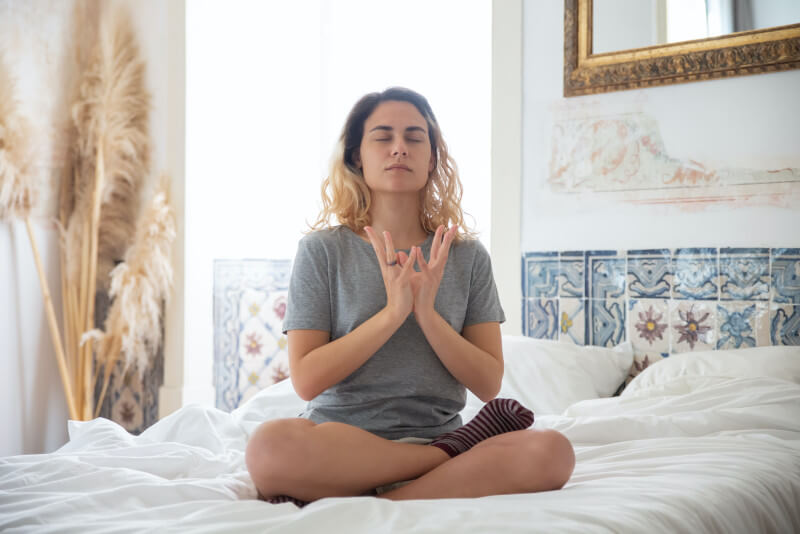It’s the late hours of the night, and you’re lying in bed, gazing at the ceiling and ruminating on things like your job, your finances, or your children. If you are having trouble falling or staying asleep, you might be tempted to take a sleeping pill or another sleep aid to get some relief. And you may understand it in the present. Having difficulty sleeping consistently, on the other hand, is a warning sign that something may be wrong.
It could be as simple as straightforward as consuming an excessive amount of caffeine or staying up late to watch television, using your phone, or using other devices with screens. It’s also possible that this issue is just a symptom of a deeper psychological or medical condition. However, sleeping tablets will not be effective in treating whatever ails you. Sleeping tablets are, at best, a band-aid solution to a momentary problem. In the worst-case scenario, they are a habit-forming crutch that, in the long term, can make sleeplessness worse.
This doesn’t mean you shouldn’t take medication, but it does necessarily imply that you should carefully consider the pros and cons of doing so before doing so. Overall, sleeping medications and other sleep aids are most useful when used infrequently for short-term circumstances, such as traveling to a different time zone or recovering from a surgical procedure. This type of use is most likely to result in the desired level of restful sleep. If you want to avoid becoming dependent on sleeping tablets or developing endurance to their effects, the best approach is to take them only on an irregular, “as required” basis rather than on a regular schedule.
The Potential Hazards and Negative Impacts of Sleeping Tablets

There are negative reactions that can occur from taking sleeping tablets prescribed by a doctor. These reactions differ from one sleeping tablet to the next, as do their dosages and the lengths of time they remain in your system. The following day you may experience continuous lethargy, headaches, muscle pain, constipation, dry mouth, trouble focusing, lightheadedness, shakiness, and rebound insomnia as common side effects of this medication.
Additional Dangers Posed by Sleeping Tablets
Tolerance for drugs You may, throughout some duration of time, become accustomed to sleep resources, which means that you will need to take increasing amounts of them to ensure that they are effective. This, in turn, may cause you to experience an increased number of adverse effects.
Drug Reliance
It’s possible that over time, you’ll become dependent on sleeping tablets to the point where you won’t be able to sleep at all or will sleep even less soundly without them. Especially pills obtained through a doctor’s prescription can be highly addictive, making it challenging to withdraw from their use.
The Symptoms of Withdrawal
If you suddenly stop taking the medication, you might experience withdrawal symptoms like nausea, perspiring, and shaking. Other symptoms may also occur.
Interactions Between Medications
Sleeping tablets can engage negatively with other meds. This can make the adverse effects worse and even be hazardous at times, particularly when it comes to pain meds and other tranquilizers that require a prescription.
Insomnia is Caused by a Rebound
If you have to stop taking sleeping tablets, there is a chance that your insomnia will become even more severe than it was before.
Disguising a Root Issue
Your inability to fall or stay asleep could be the result of an underlying medical condition, mental illness, or even a chronic condition that cannot be remedied by taking sleeping tablets.
There Are Several Significant Dangers Associated With the Use of Sleeping Tablets
A serious allergic response, facial swelling, memory problems, paranoid delusions, thoughts of suicide or behavior, and complicated sleep-related behaviors such as sleep-walking, sleep-driving (continuing to drive while not fully awake, with no recollection of the event), and sleep-eating can be caused by sedative-hypnotic medications (benzodiazepines and non-benzodiazepines).
Herbal and Nutritional Sleep Aids That Could Possibly Be of Assistance

If you go to a local pharmacy, you will see lots of sleep supplements that are marketed as being “natural.” The Food and Drug Administration does not regulate nutritional supplements in terms of safety, reliability, efficiency, or even honesty in labeling; therefore, it is up to you to do your research and make an informed decision. Even though there is contradictory evidence, the following nutritional supplements contain the most studies to back their use as treatments for insomnia:
Valerian
Since the 2nd century A.D., anxiety and insomnia have been treated with the sedative herb valerian, which is also known as valerian root. It is thought to work by elevating levels of the soothing chemical GABA in the brain. Even though there hasn’t been a significant amount of study conducted on the effectiveness of valerian for treating insomnia, the research that has been done demonstrates commitment, and valerian is generally regarded as being safe and non-addictive. It is most effective when consumed daily for at least two weeks.
Melatonin
Melatonin is a hormone that is generated organically and in greater quantities during the night. It is brought on by the absence of light, and its concentrations continue to rise throughout the night until they are brought down by the brightness of the morning. Melatonin may help with sleep problems that are brought on by jet lag and shift work, even though it doesn’t appear to be especially beneficial in treating the majority of sleep disorders.
On the other hand, it’s possible that a straightforward light exposure at the appropriate time could be equally useful. Melatonin has the potential to interact negatively with several medications, including those used to treat diabetes and high blood pressure. It is best to continue with smaller concentrations, which for most people means one to 3 milligrams, to reduce adverse effects and drowsiness the following day.
Chamomile

Chamomile tea is consumed by a lot of people due to the mild sedative effects it has, even though some people who have allergies to plants or pollen may experience an allergic reaction to it. If you want the full benefit of this tea’s ability to help you fall asleep, bring a pot of water to a boil, add 2 or 3 tea bags (or an equal amount of loose-leaf tea), cover the pot, and let it steep for 10 min.
Tryptophan
Tryptophan is an essential amino acid that is required for the production of serotonin, a chemical messenger that is produced in the brain and is responsible for signaling to the body that it is time to go to sleep. L-tryptophan is a by-product of tryptophan, which is something the body can convert into serotonin. Tryptophan is an essential amino acid. L-tryptophan, according to the findings of some studies, can hasten the process by which people nod off to sleep. However, there has been a lack of consistency in the results.
Kava
It has been demonstrated that taking kava can help people who have trouble sleeping due to stress. However, because kava can damage the liver, it should only be consumed under the close guidance of a trained medical professional.
Lavender, passionflower, and lemon balm are three additional herbs besides chamomile and valerian that have been discovered to have a sedative or calming effect. There are several organic sleep supplements out there, and most of them use a mixture of these ingredients to help people fall asleep.
As a Substitute for Sleeping Tablets, Practicing Relaxation Exercises Can Be Beneficial

Simple meditation techniques, gradual muscle relaxation, pilates, tai chi, breathing deeply, and other forms of exercise and mindful movement are examples of soothing methods that can assist in alleviating stress and facilitating sleep. These skills, when practiced properly, can help you relax before falling asleep and enhance the quality of your rest more successfully than a sleep aid or other sleep aid could ever do. Try:
A soothing routine to follow before bed. At least one hour before going to bed, you should turn off all electronic screens and instead engage in activities that are calm and relaxing, such as reading, soft yoga, or listening to soothing music. Reduce the amount of light in the room to help your body produce more melatonin.
Stomach Breathing
The vast majority of us do not take sufficiently deep breaths. When we breathe in a manner that is both deep and complete, engaging not only the chest but additionally the tummy, lower back, and torso, we are providing support to the component of our nervous system that is accountable for relaxation. Try closing your eyes and breathing deeply and slowly, focusing on making each breath more profound than the one before it. Take a breath in through your nose, and then release it out of your mouth. Make sure that you exhale for a slightly longer period after each inhale.
The Process of Gradual Muscle Relaxation is Simpler to Perform Than It May Sound
Put your feet up or otherwise make yourself comfortable. Beginning with your feet, flex and extend your toes as far as you comfortably can. Ten counts of holding, and then release all tension. Repeat this motion for each of the muscle groups in your body, starting at the bottom of your feet and moving your way up to the crown of your head.
A Good Workout is One of the Most Effective Sleep Aids
Exercising throughout the day may help one sleep better at night, according to several studies. When we work out, our core temperature goes up significantly, and then, a few hours later, it goes down significantly again. This cycle continues until we stop moving our bodies. The decrease in our core temperature makes it simpler for us to enter and remain sleeping. Exercise is most beneficial when performed in the early evening or late afternoon instead of right before going to bed. Attempt to spend at least thirty minutes on each of the four days of the week. Because they boost the quantity of oxygen that is delivered to the blood, aerobic exercises are the most effective treatment for insomnia.







